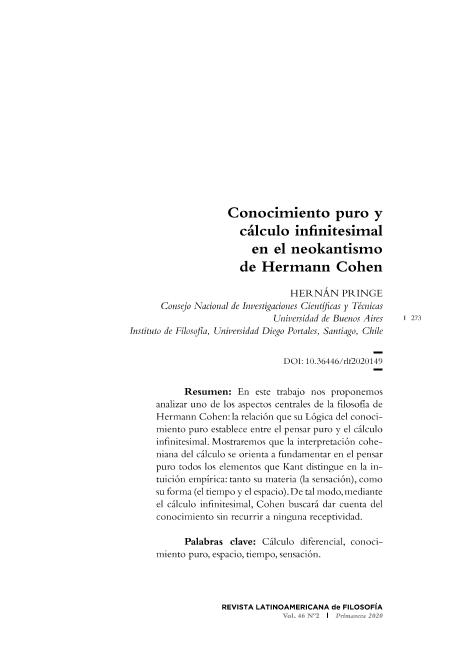Artículo
En este trabajo nos proponemos analizar la relación que Hermann Cohen establece entre el conocimiento puro y el cálculo infinitesimal. Mostraremos que la interpretación coheniana del cálculo se orienta a fundamentar en el pensar puro todos los elementos que Kant distingue en la intuición empírica: tanto su materia (la sensación), como su forma (el tiempo y el espacio). De tal modo, mediante el cálculo infinitesimal, Cohen buscará dar cuenta del conocimiento sin recurrir a ninguna receptividad. The aim of this paper is to analyze one of the central aspects of Hermann Cohen's philosophy: the relationship that his Logic of pure knowledge establishes between pure thought and infinitesimal calculus. We argue that Cohen's interpretation of calculus seeks to ground in pure knowledge all the elements that Kant distinguishes in empirical intuition: both its matter (sensation) and its form (time and space). In this way, by means of infinitesimal calculus, Cohen tries to account for knowledge wi- thout appealing to any receptivity.
Conocimiento puro y cálculo infinitesimal en el neokantismo de Hermann Cohen
Título:
Pure knowledge and infinitesimal calculus in Hermann Cohen’s neokantianism
Fecha de publicación:
11/2020
Editorial:
Centro de Investigaciones Filosóficas
Revista:
Revista Latinoamericana de Filosofía
ISSN:
0325-0725
e-ISSN:
1852-7353
Idioma:
Español
Tipo de recurso:
Artículo publicado
Clasificación temática:
Resumen
Palabras clave:
Hermann Cohen
,
Cálculo diferencial
,
Sensación
,
Realidad
Archivos asociados
Licencia
Identificadores
Colecciones
Articulos(SEDE CENTRAL)
Articulos de SEDE CENTRAL
Articulos de SEDE CENTRAL
Citación
Pringe, Hernan Bruno; Conocimiento puro y cálculo infinitesimal en el neokantismo de Hermann Cohen; Centro de Investigaciones Filosóficas; Revista Latinoamericana de Filosofía; 46; 2; 11-2020; 273-288
Compartir
Altmétricas




